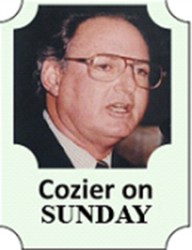“Management at all levels has degenerated into an ongoing story of incompetence, internal wrangling and court cases. The more they have grown, with escalating, fully professional personnel, the more the problems mount.”
It has become a habitual question that continues to defy an acceptable answer.
The West Indies Cricket Board (WICB) has twice commissioned reports to recommend changes to its governance; each time it ignored their main points.
In the meantime, the game in the region has gone into such a state of decline that the team that dominated the world for 15 years now languishes near the bottom of the International Cricket Council (ICC) rankings; simultaneously, the WICB is teetering on the brink of bankruptcy.
The former Jamaican prime minister, P.J. Patterson, who headed the committee that prepared the first document in 2007, complained that he and his two other committee members had wasted two years of their lives working on the assignment.
 Five years later, Queen’s Counsel Charles Wilkin of St. Kitts & Nevis, at one time a left-arm spinner for Cambridge University and the Leeward Islands, heatedly quit as head of the governance committee after the WICB directors “refused to make any change at all to the current structure.” He charged that the incumbents “wanted to preserve at all costs all of their positions on the board.”
Five years later, Queen’s Counsel Charles Wilkin of St. Kitts & Nevis, at one time a left-arm spinner for Cambridge University and the Leeward Islands, heatedly quit as head of the governance committee after the WICB directors “refused to make any change at all to the current structure.” He charged that the incumbents “wanted to preserve at all costs all of their positions on the board.”
As it was since its formation in 1927, the WICB still comprises two directors from each of its regional members, now six in all, who elect the president and vice-president.
Patterson and Wilkin both proposed profound changes, among them a reduction in the number of directors.
In addition, Patterson put forward the introduction of additional representatives from the Caribbean Community governments, the private sector, tourism and the University of the West Indies (UWI); Wilkin pressed for a nominations committee “to identify and recommend persons with appropriate skills and experience to serve as elected directors.”
The issue is now being revisited by a committee appointed by the regional Caribbean Community (Caricom) governments. It is headed by Sir Denis Byron, president of the Caribbean Court of Justice, and includes former West Indies vice-captain Deryck Murray.
With such political backing and high-profile leadership it carries such clout the WICB would be ill-advised to treat its report the same way it has those of Patterson and Wilkin.
Judging by the profusion of comments in the media and on internet websites and from its interviews with a wide cross-section of interested parties, it would have formed a consensus on Patterson’s stated view that “the status quo is unacceptable,” that change was needed.
There have been thoughtful articles over the past week from Wilkin and from Dr. Rudi Webster, the West Indies manager in World Series Cricket and subsequent psychologist to the team.
Wilkin believes the forthcoming Supreme Court of India’s decision on changes and improvements necessary for the India board to be “more transparent and more responsive to the public at large” should give “fresh impetus” to resolving similar issues in the Caribbean.
Webster points the finger at the WICB’s leadership.
“The single and probably the most significant factor in the success of any organization is the behavior of the people who are leading it,” he states. “Like any poorly performing organization, the WICB should now take a careful and honest look at itself and the quality of its leadership. It is very difficult for an organization to rise above the level of its leadership.”
The recent death at 89 of Peter Short, the longest serving administrator in West Indies cricket, brought into focus the correlation between success in the board room and on the field.
The contrasts in the management of the game in Barbados and the West Indies during his involvement with a host of able, dedicated colleagues over 32 years, between 1964 and 1996, and that of the dispensations that followed is stark.
Drastic deterioration
The cricket was never stronger, on the field and off it, than it was during Short’s unprecedented 19 years as elected Barbados Cricket Association (BCA) president and subsequent four as head of the WICB. Barbados won the regional Shell Shield title ten times over 19 seasons, West Indies went 15 years unbeaten in a Test series.
In the two decades since, there has been drastic deterioration in both areas.
Management at all levels has degenerated into an ongoing story of incompetence, internal wrangling and court cases. The more they have grown, with escalating, fully professional personnel, the more the problems mount.
With six WICB presidents over the past 15 years, continuity and stability have been impossible. Voting for the head of both West Indies and regional boards is now conducted with the antagonism of political elections.
The alienation of leading players has led to three strikes, none more damaging than the withdrawal of the team from the scheduled tour of India last October; the claim for US$42 million compensation from the Board of Control for Cricket in India (BCCI) still hangs like a guillotine over the WICB’s exposed neck.
Prime ministers have been called on to settle one issue or another; the latest is the Caricom committee that will soon hand in its report.
Appointed delegates defied the mandate of their association in a recent presidential election. The organization of the game in Guyana has been in turmoil for more than two years as its various constituents wrestle over its control.
The Leeward Islands, a powerhouse that turned out Andy Roberts, Viv Richards, Richie Richardson, Curtley Ambrose and the Benjamins in the 70s and 80s, have become perennial also-rans in the regional tournaments without a representative on the West Indies team.
In keeping with the times, WICB principals are now paid. In the past, there was no thought of remuneration or personal advantage.
Literally, on the face of it, Short seemed an anachronism. He was a white Bajan with a trademark handle-bar moustache who had served in the British Army and risen to the rank of his enduring title “captain”; as a useful club player, he captained Wanderers Club, then all-white, to the 1959 Barbados club championship, later to become its president.
It was deceptive profiling.
“Peter Short, I believe, was misunderstood,” Sir Hilary Beckles wrote in his tome, “The Development of West Indies Cricket” in 1992. “He did not represent the old dispensation as many have said. Rather, he was part of the respected nationalist network of civic society that believed in cricket as a cultural activity for gentlemen, part of the infrastructure of high moral values and social contact.”
Such words no longer apply to the governance of Barbados and West Indies cricket.









